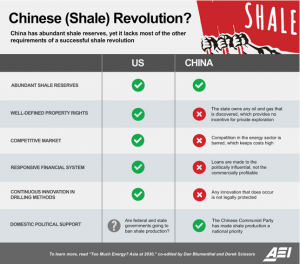On paper, China seems to be poised to drastically increase its natural gas production in the upcoming decade. With 50% more shale gas reserves than the United States, the world’s largest natural gas producer, China can potentially satisfy its voracious domestic energy demand. However, while the introduction of horizontal drilling and hydraulic fracturing in the US may have made the whole process of revolutionizing a nation’s energy industry smooth and easy, such is not the case for China.
Unlike the US, the Asian superpower’s economic and natural environments are not ideal for shale gas extraction. As the name hydraulic fracturing implies, very large amounts of water are necessary to tap shale resources. Most of China’s natural gas shale resources are in arid dessert where water is hard to find.
Additionally, China’s politics make it hard to introduce all the technology and infrastructure that made fracking such a success in the US. While innova tion and ingenuity transformed the US into an energy superpower, China’s energy market is dominated by big, stagnant state-owned companies. The American companies that spent billions of dollars developing and perfecting horizontal drilling and hydraulic fracturing technologies do not feel their intellectual property will be safe if they cooperate with Chinese exploration companies.
tion and ingenuity transformed the US into an energy superpower, China’s energy market is dominated by big, stagnant state-owned companies. The American companies that spent billions of dollars developing and perfecting horizontal drilling and hydraulic fracturing technologies do not feel their intellectual property will be safe if they cooperate with Chinese exploration companies.
Sources: http://theenergycollective.com/roman-kilisek/2202226/chinese-shale-revolution-offing
http://www.forbes.com/sites/kenrapoza/2012/02/13/china-closer-to-joining-shale-gas-fracking-craze/

Expertise can be hired, particularly with exploration in the US in steep decline. As to the geology, well, if fields have yet to be tapped, then the more expensive “fracking” technologies may not be the margin at which firms will initially be operating. But that’s speculation on my part. In any case these areas are on average remote. Pipelines also have to be built, and that’s neither quick nor cheap.
It seems like to implement fracking in China, it will require large amounts of initial investment. This can potentially come from the shadow banking system and will therefore be difficult to regulate. In those remote areas, the local governments will need to provide infrastructure such as pipelines, which will be difficult to do because governments aren’t able to use the shadow banking system as easily.
This is the sort of development to which formal banking system and bond markets are suited. I don’t know how much money the People’s National Oil Company has accumulated – PNOC has undertaken many large-scale projects outside the country, so I suspect they both have some resources and can raise more. (Pipelines may be the purview of a different company — I don’t know.) Nevertheless, the amounts involved would be large, so it would need to be a project with solid backing of the central government. Uncoordinated efforts by provincial governments would not work, and shadow banking isn’t geared toward the 10-year or greater time frame of such projects.